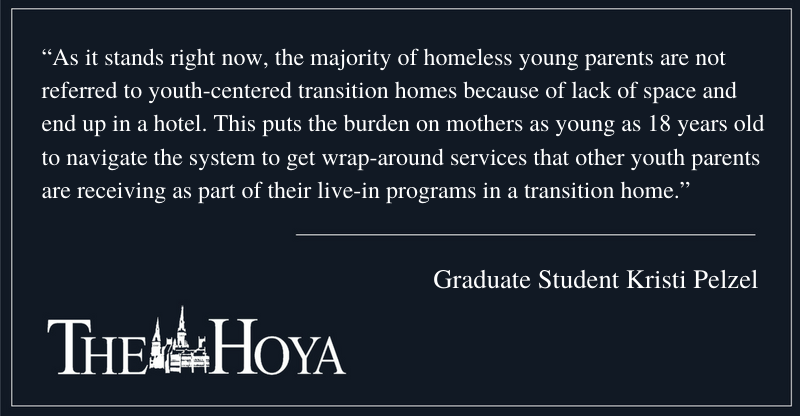Homeless young parents, defined as under 24 years old and pregnant or with a child, are no longer considered youth, and are not a “population in focus,” according to Washington, D.C.’s Solid Foundations D.C.: Strategic Plan to Prevent and End Youth Homelessness. Homeless young parents are sent to adult-centered services, while all homeless single youth receive youth-centered services. Very few young families will be placed in youth-centered transition homes with fully customized support services on site.
At the Georgetown University Public Policy Challenge finals Friday, March 20, Brittany Panetta, Yamel Sarquis Elias and myself, all second-year graduate students, will advocate for young parents to be considered a youth subpopulation and a significant data point, within D.C.’s written policy on homeless youth. We noticed a pattern, conducted field research and found that there is a group of people who urgently need to be seen and heard. Reclassifying young parents will bring more focus to their needs and prompt service providers to collaborate and coordinate care if it’s a written policy.
There are three main arguments for why we should consider youth parents a population in focus within Solid Foundations and in the District’s adult-centered Homeward D.C. plan. One, young parents are underrepresented in D.C.’s homelessness goals and laws. Two, young parents are put at significant risk of perpetual homelessness. Three, homeless young women are more likely to become pregnant than their housed peers.
A significant data point in the D.C. homeless population, young parents are an underrepresented population in both the federal and local census. If we don’t acknowledge young parents in written policy and separate them out in the bylaws from other populations, they will not be treated with the urgency and care they need.
As it stands right now, the majority of homeless young parents are not referred to youth-centered transition homes because of lack of space and end up in a hotel. This puts the burden on mothers as young as 18 years old to navigate the system to get wrap-around services that other youth parents are receiving as part of their live-in programs in a transition home.
Eighty percent of homeless young women are likely to become pregnant by age 26 and 38% by age 20, according to the National Conference of State Legislatures. Federal census numbers, however, don’t reflect these data points, resulting in less policy, less social services training and higher continuous cycles of homelessness. If we don’t count this population correctly, we can’t fully understand their needs to help them transition to independence.
Young parents slip through the system. Young people with kids are often not on the streets because they move around between friends’ and family’s homes, sleeping on buses or pooling money to get a hotel. Federal and D.C. Point in Time reports far fewer because their count does not account for transient youth.
When a group is hard to track down, it seems smaller because its members are rarely seen or heard from. As a result, public priorities shift to serve the more obvious demographics. Not counting young parents as youth and nesting young parents within a families category without making them a subpopulation of families is avoiding a demographic in the homeless population that heightens the risk of these young families.
As a city, we can solve the problem by representing young parents in policy, counting them in accurate census and creating more collaboration to mirror the wrap-around services young parents in youth-transition homes receive. Let’s all keep pushing for transparency and advocacy for young parents in D.C.
Kristi Pelzel is a second-year graduate student in Communication, Culture & Technology (CCT) Master of Arts Program.















Joseph William • Mar 3, 2020 at 6:43 am
Hey Kristi, thank you for useful tips! Such a serious problem really exists, and it is very important that these people feel the care of the state.
Leconte Lee • Feb 25, 2020 at 9:35 am
Here are tips for helping homeless youth succeed in college, including tips for parenting students: https://www.schoolhouseconnection.org/tips-for-helping-homeless-youth-succeed-in-college/